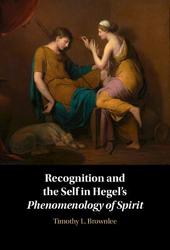
|
Recognition and the Self in Hegel's Phenomenology of Spirit
Hardback
Main Details
| Title |
Recognition and the Self in Hegel's Phenomenology of Spirit
|
| Authors and Contributors |
By (author) Timothy L. Brownlee
|
| Physical Properties |
|
| Category/Genre | Western philosophy - c 1600 to c 1900
Philosophy - metaphysics and ontology |
|---|
| ISBN/Barcode |
9781009098236
|
| Classifications | Dewey:193 |
|---|
| Audience | |
|---|
| Illustrations |
Worked examples or Exercises
|
|
Publishing Details |
| Publisher |
Cambridge University Press
|
| Imprint |
Cambridge University Press
|
| Publication Date |
15 December 2022 |
| Publication Country |
United Kingdom
|
Description
Hegel's Phenomenology of Spirit is famed for its account of the problem of recognition. Yet while readers agree about the importance of its influential accounts of the struggle to the death and the master/slave relation in developing that problem, there is no consensus regarding what sorts of relations among subjects would count as successful forms of recognition. Timothy Brownlee articulates the essential connections between Hegel's concepts of recognition and the self, and presents a novel interpretation of the Phenomenology that traces the emergence of actual relations of reciprocal recognition through the work as a whole. He focuses on the distinctive social constitution conception of the self that Hegel develops in his account of 'spirit,' and demonstrates that the primary significance of recognition lies in its contribution to self-knowledge. His book will be valuable for scholars and students interested in Hegel, German Idealism, and philosophical conceptions of recognition.
Author Biography
Timothy L. Brownlee is Professor of Philosophy at Xavier University where he also directs the Philosophy, Politics, and the Public Honors Program. He is the author of numerous articles on Hegel's practical philosophy and aesthetics, German idealism, and social and political philosophy.
Reviews'An impressive work of scholarship, this book is a welcome addition to the literature on Hegel. Addressing two central topics - the accounts of recognition and of the self - in the Phenomenology of Spirit, it offers a new, persuasive interpretation of their roles and dynamics in Hegel's text. Brownlee writes with clarity and conviction that stem from his mastery of Hegel's thought and from the penetrating analysis of the key philosophical concepts he discusses. This study is essential reading for any student and scholar of Hegel.' Marina Bykova, North Carolina State University
|